“What’s the matter?” Chad asked as we strapped on our seat belts for the flight south.
“They’re gonna get off in Puerto Montt,” I said.
“What? No way. They wouldn’t do that.”
Due to an issue with their tickets, which had been purchased from a dodgy online discount clearinghouse, two of the anglers in our group, Lorin and Keith, weren’t with the rest of us on our flight from Santiago to Balmaceda. Thankfully, the helpful agents with the airline had been able to secure seats for the two brothers on another flight two gates down that was also headed to Balmaceda after it made a quick stop along the way in the coastal Chilean town of Puerto Montt.
I’ve known Lorin for years. He’s the happiest guy on the planet – nothing phases him. He’s a successful entrepreneur and a good old Idaho potato farmer. Lorin is one of those helplessly curious people. He never meets a stranger. He never starts a conversation without a smile on his face. And, sometimes, he can be a little oblivious.
I don’t know Keith as well as I know Lorin, but I like him. I’ve noticed that the two brothers share that same friendly trait, one that has likely helped earn both of them very successful careers. They’re endlessly gregarious and thoughtful. Yet, on occasion, they can be comically unaware of what’s happening around them.
“Oh, yeah,” I said. “They totally will.”
The four of us who did make the direct flight to Balmaceda were greeted at baggage claim by a couple of staffers from Magic Waters Lodge. Knowing Lorin and Keith were scheduled to come in about 45 minutes behind us, I stayed behind with Tomás, the lodge’s irreplaceable utility player, to wait for the two wayward anglers. It was the longest 45-minute wait. Ever.
When the plane finally landed, my relief was palpable when I saw both Lorin and Keith wander into the baggage claim area. I was certain the two were destined for an overnight stay in Puerto Montt and a late arrival to the lodge. That wouldn’t have been the end of the world, but when you plan a weeklong fishing trip to another continent, a lost day kind of smarts.
Tomás, playing the role of the reassuring tour guide, patted my back and said, “See? It’s all going to be all right.”
When the brothers had collected their bags and I was able to let them know that the rest of the gang was already at the lodge, Lorin gave me a sheepish look.
“You’re not gonna believe this, Chris,” he said. “But we got off the plane in Puerto Montt.”
The same trusting good nature and laissez faire approach to life that got them in the predicament in the first place is likely what saved them. Lorin made friends with his seatmate on the flight from Santiago to Puerto Montt and had regaled her with tales of the fishing he was about to experience at Magic Waters. So, imagine her surprise when, as she was collecting her bags in Puerto Montt, she saw Lorin and Keith waiting for their bags, too.
“I thought you were going to Balmaceda,” she said to Lorin.
“We are,” he said.
“This isn’t Balmaceda,” his new friend replied. “You were supposed to stay on the plane.”
I could only imagine the mayhem that ensued, and, honestly, I didn’t want to know all the details. I was just thrilled that the two brothers from the sticks of Idaho somehow got back on the plane they had just abandoned and found their way to Balmaceda. I wouldn’t call it a miracle. But I also wouldn’t exclude divine intervention.
The four of us piled into the lodge truck, Tomás behind the wheel for the 40-minute drive to the lodge. The drive starts on the high steppe of Patagonia, within sight of the border with Argentina. It ends at the lodge, which is perched over an idyllic Andean lake, after skirting the city of Coyhaique and driving through some wonderfully scenic country. Along the way, Tomás pulled over no less than four times so we could take photos.
We were greeted at the lodge by the rest of the gang. Everyone was thrilled to be reunited with Lorin and Keith after the separation at the Santiago airport. I wasn’t going to say anything about the two tourists getting off the plane in the wrong city, but Lorin fessed up immediately.
Chad, a bewildered expression on his face, looked at me across the lodge’s spacious common room.
“How did you know?” he asked.
I shrugged my shoulders and looked at Lorin. “I know my little buddy.”
The tourist goes fishing
Lorin’s not an experienced fly fisher. In fact, he later described his week with the group in Chile as an immersive experience at “Trout University.” He and I have fished together occasionally in Idaho — he with his spinning gear and me with my fly rod. But he’d never been on a “real” fly fishing trip, and by the second day in Patagonia, a new world had been opened.
“Oh, my gosh,” he would begin every recap when someone asked him how his day went. Then, he would launch into a descriptive tale about the waterfalls he saw, or the views that he caught on his iPhone. Then, when pressed, he’d answer the big question.
“Oh, yeah,” he’d say. “We caught some fish.”
On the third day, Lorin and Keith joined me and my fishing partner for the week, a great guy named Jim, on a horseback ride into the wilds of the Rio Mogote, a rainforest river that flows cold and perfectly clear, slicing through a canyon in the middle of nowhere.

Lorin, who grew up on a farm in eastern Idaho, is perfectly at home on a horse, and, again, proved to everyone around him that he was on this trip not so much for the fishing, but for the holistic intake. As I worked to stay on the horse a local gaucho paired me with, Lorin busied himself snapping photos of anything and everything as we ventured into the backcountry.
“It’s all so beautiful,” he said. “Everywhere you look, it’s a postcard.”
Lorin and Keith split from Jim and I about 20 minutes into the ride. The idea was to separate and then fish until around 2pm, when we’d meet at a designated site for lunch— a delicious cordero al palo (lamb roasted on a spit over an open fire).
And the fishing was good. Our guide, Ives, put Jim and I on fish at a pretty regular clip — sight-fishing to hungry browns and rainbows in the Mogote was a real treat. After sticking a nice 18-inch brown that lurked in the shadow of a sheer cliff face, I was ready for lunch. Jim, Ives and I wandered back down the river and met Lorin and Keith, who were busy taking photos of the meat sizzling over the flames.
When lunch was served, Lorin, Jim and I talked over a glass of delicious red wine, and then Lorin started emptying his pockets.
“Look at all these cool rocks!” he exclaimed, holding out a handful of riverside stones he collected over the course of the morning. “The colors are just amazing.” Only the word “amazing” came out “amaaaaaaazzzzzing!”
Lorin collects and then polishes rocks from all of his adventures. It’s one of his many side hobbies. I’d known Lorin for years before I knew this. It also took me years before I knew he was an accomplished artist, and that he was the one who designed the iconic sculpture and water feature that has become quite the regional attraction in our hometown of Idaho Falls. It sits amid a round-about in the middle of town and features two giant eagles, wings spread, as they fight off a mountain lion that’s threatening their nest.

I glanced at the rocks with polite interest, knowing that Lorin’s suitcase would be quite a bit heavier on the way home than it was upon arrival. But rocks are rocks, right?
“What we really want to know,” Jim asked, “Is … did you catch any fish?”
Lorin shrugged and smiled. “Yeah,” he said. “We caught a few.”
Lost on the lake
The best thing about fishing out of Magic Waters Lodge may well be the variety of angling available. Anglers can bounce down the freestone Rio Paloma in the heart of the rainforest, stalk wily browns in a high-country spring creek or fish for cruising browns and rainbows on one of dozens of nearby lakes.
And the fishing over the course of our week was predictably stellar. Thanks to the COVID-19 outbreak and the fact that Chile had been closed to international travel for the better part of two years, the normally unpressured lakes and rivers of the region have enjoyed a complete reprieve from far-flung anglers. We arrived just a few days after travel restrictions were relaxed, and were among the first Americans to fish the Aysen Region of Patagonia since the country locked down amid the pandemic.
On the last fishing day, Lorin and I finally got to fish together. We were paired with our guide, Guillermo, who proved to possess an amazing “fish eye” earlier in the trip, when he helped me land a particularly finicky, but unusually big, rainbow in a lake outlet. Lorin is about 5-foot 2-inches tall. Guillermo isn’t as tall as Lorin. I’m 6-feet 5. It was quite the group.

Guillermo took us to a nearby lake to chase big browns that cruised the banks. The lake wasn’t teeming with fish, he explained, but the fish we’d see — and hopefully catch — would be big. Both Lorin and I nodded our heads. Beautiful lake. Big fish. And, oddly, without the pressure of trying to put up numbers, both of us were thrilled at the prospect of spending a full day boating around a Patagonian lake and just taking it all in.
The week I spent with Lorin was therapeutic. Whether he knows it or not, he’s someone who reminds you that whatever it is you’re doing, there’s a journey involved in the endeavor. I love to fly fish. I love to fly fish so much that, quite often, I forget to look up and see what else is going on. As we motored around Big Fish Lake looking for cruisers or casting to structure, I was constantly scolded by Lorin for not taking in the enormity of it all.
“Look at that waterfall,” he’d say, pointing across the lake at a thin ribbon of water that started in a snowfield thousands of feet up only to dive off a cliff, disappear into the beech forest and then reappear again, this time cascading into the lake.
“The moss on these trees is unreal,” he said over lunch that day. Later, as we climbed back into the boat to continue the hunt for big trout, Lorin marveled at how the beech trees near the lake grew in scraggly patterns, creating an almost net-like appearance of branches and limbs. These subtleties would have been lost on me had Lorin not been there to point them out. And he’s right. It’s all part of the experience, not just the part of seeing a surfacing fish and putting a fly in the rise ring.
And that latter bit happened more than a few times that last day. Guillermo rowed the cata-raft along the lake’s structure-rich banks and was quick to spot cruising trout. And we caught a few real bruisers, including one monster that was cruising a weed bed.
And Lorin was there again, to remind me to keep my eyes open.
“Look at the colors on that fish,” he said. “It’s so golden and bright. I’ve never seen a brown trout that color before.”

He was right. The fish was especially bronze, likely because this particular lake is a bit tannic — the tea-stained water likely brings out the trout’s ability to blend and take on some camouflage.
As the day neared its end, Guillermo had us tight to a bank where he was certain we’d see a big fish. And he was right. Lorin made a nice cast toward the bank over a sunken network of drowned beech trees. His big Fat Albert landed with an appreciable “splat!” and both Guillermo and I saw the big brown start to come up from the depths.
The fish, well over 20 inches, lazily climbed the water column. Up it swam. Higher and higher.
“Here he comes,” I said quietly.
“Get ready,” Guillermo whispered.
The fish grabbed the fly and turned downward. It dove, but in no particular hurry.
“Set,” Guillermo said to Lorin.
Nothing.
“Set the hook,” I said a little louder.
Still nothing.
“Set! Set!” Guillermo was done being nice.
“Lorin!” I shouted. “What the hell don’t you understand about ‘set the hook!?’”
At this point Guillermo stood up, grabbed the fly rod from Lorin’s hands, set the hook into the jaws of the massive brown, and calmly handed the rod back to Lorin.
“Set. The. Hook!” Guillermo said, half shouting and half laughing.
“Oh!” Lorin exclaimed, realizing he was holding a fly rod with a very big brown trout on the end of the line. “I was looking at that ridgeline and noticing the different foliage up there,” he said.
I just shook my head. I hadn’t noticed the different trees on the ridgeline. I was fishing. Guillermo was fishing. Lorin was on an adventure.
He eventually landed the fish — the biggest of the day, by the way — and we all snapped photos of Lorin and his big brown that almost didn’t happen. We laughed about it all the way back to the lodge, and Lorin just joined in, unabashed at the grief he was catching.
“You all are such great fly fishers,” he said to the rest of us over dinner that night, our last at the lodge. “I’m just happy to be along for the ride.”

Home again
Lorin and Keith left for home the next day. The rest of us spent another week at a backcountry camp on the wild banks of the Rio Blanco, so it was a couple of weeks before I got to see Lorin again and catch up with him. He and his wife Vikki are dear friends, and we get together often. At a holiday party at our house, Lorin took me aside.
“Hold out your hand,” he said to me. I put my hand out. In it, he placed a perfectly polished rock, likely plucked from the banks of the Mogote. It was almost orange and striped with creamy quartz. In the lights of the kitchen chandelier, it seemed to magically glow.
“I just want you to know that I had the trip of a lifetime,” he said. “I’m so grateful that I got to go with you. Here’s a little piece of Patagonia that you can keep with you, always.”
I was being tutored once again by my friend. The lesson? That every detail, no matter how small, is integral to the experience. It's not simply where you go, who you’re with, what you do, or how many fish you catch. It’s the sum of it all—the compound interest earned from an adventure halfway around the world.
I looked fondly at the little rock in my hand. No, rocks aren’t just rocks. Lesson learned.


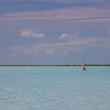
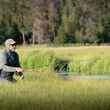
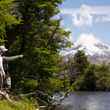
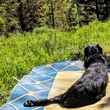
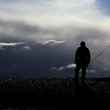
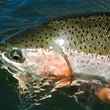
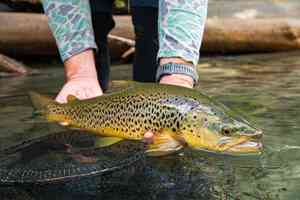


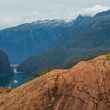
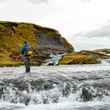

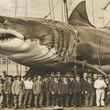

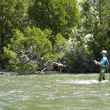



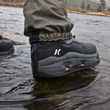



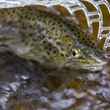
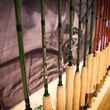
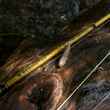
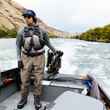
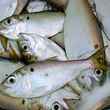
Comments
doug balfour replied on Permalink
What a wonderful story. I can picture it well. Lorin sounds like a lot of the locals here, an unpolished gem in love with life.
Glenn Dotter replied on Permalink
I guess when you have the money, climate change isnt real.
Paul replied on Permalink
It may be a mixed blessing that we fly anglers are bombarded with a lot of fly "journalism" these days. There is a lot of content out there from well-meaning writers who oftentimes fall short of creating interesting stories, fraught with poor grammar and syntax.
You, Mr. Hunt, are not one of them. This was a tale with subtle strength and an overriding message we can all take to heart. Well done, and I shall add Magic Waters to my ever-expanding bucket list in hopes that I can have the same memorable experience.
Thank God for good friends and good trout water.
Skip Gardner replied on Permalink
Thanks, Chris, for another great essay. As you have written, fishing is much more than catching; it is comradeship, scenery, sport, life. See you on the Snake River flats in early summer.
Pages